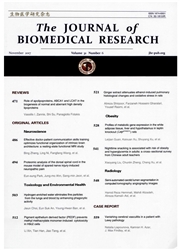

 中文摘要:
中文摘要:
膀胱癌症是尿系统的最普通的恶意。男人的膀胱癌症的发生比女人(近似 4:1 ) 的高。这里,我们总结膀胱癌症相关的风险因素,包括环境、基因的因素。在最近的年里,尽管膀胱癌症导致的死亡率逐渐地稳定或减少,公共健康效果可能是显著的。为膀胱癌症的生长得很好的风险因素是香烟吸烟和职业暴露。基因因素也在危险性起重要作用到膀胱癌症。最近的研究证明世袭 non-polyposis colorectal 癌症与膀胱癌症的增加的风险被联系。自从 2008,染色体宽的协会学习(GWAS ) 被用来为膀胱癌症识别危险性 loci。进一步的基因基因或基因环境相互作用研究需要被进行为膀胱癌症的病原学提供更多的信息。
 英文摘要:
英文摘要:
Bladder cancer is the most common malignancy of the urinary system. The incidence of bladder cancer of men is higher than that of women (approximately 4:1). Here, we summarize the bladder cancer-related risk factors, in- cluding environmental and genetic factors. In recent years, although the mortality rate induced by bladder cancer has been stable or decreased gradually, the public health effect may be pronounced. The well-established risk fac- tors for bladder cancer are cigarette smoking and occupational exposure. Genetic factors also play important roles in the susceptibility to bladder cancer. A recent study demonstrated that hereditary non-polyposis colorectal cancer is associated with increased risk of bladder cancer. Since 2008, genome-wide association study (GWAS) has been used to identify the susceptibility loci for bladder cancer. Further gene-gene or gene-environment interaction stud- ies need to be conducted to provide more information for the etiology of bladder cancer.
 同期刊论文项目
同期刊论文项目
 同项目期刊论文
同项目期刊论文
 期刊信息
期刊信息
